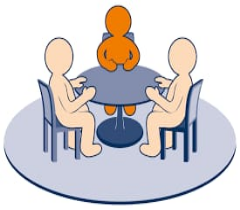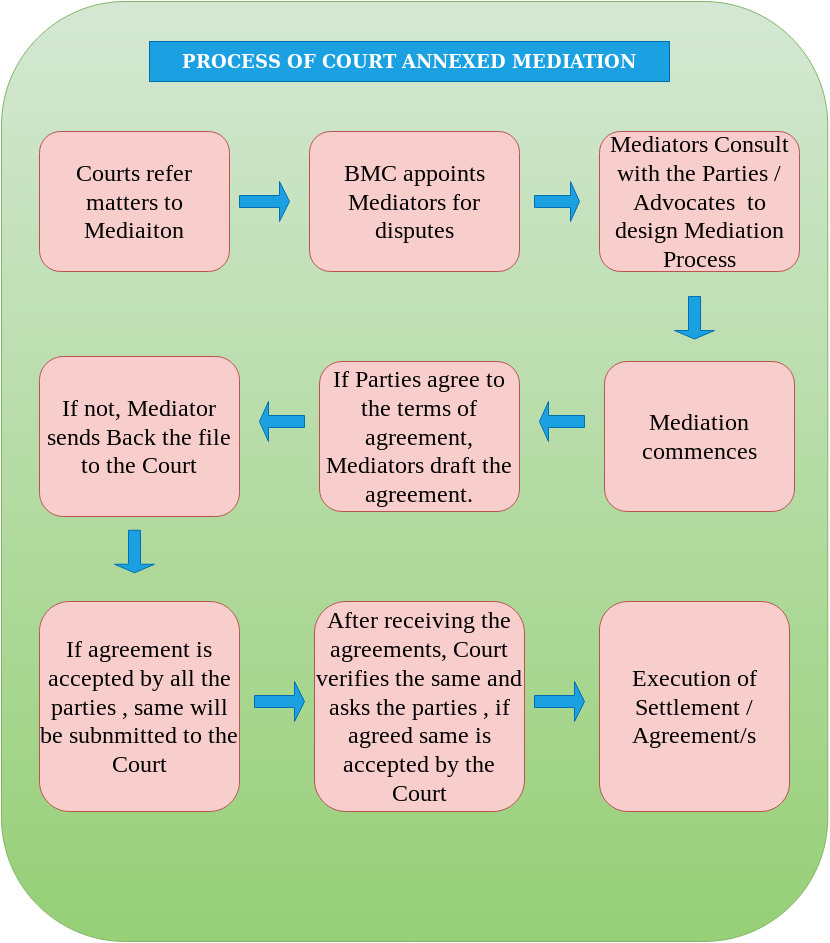WHAT HAPPENS IN MEDIAITION ?
A mediator meets both parties and their Advocates in a joint mediation sessions. The initial meeting provides for:
- An introduction to the participants
- Explanation of the mediation process
- An opportunity to discuss issues affecting settlement or which are important for the mediator to know
- An opportunity for parties to express their view of the dispute and their terms for settlement
If necessary, a mediator may meet each disputing party in private sessions. Private sessions offer opportunities to:
- Help the mediator understand the needs of each participant and the obstacles to settlement
- Explain to the party the strengths and weaknesses of his case
- Assist parties to priortise their interests in the dispute
- Explore confidentially with each side the possibilities of various settlement options
The mediator will spend as much time as necessary with the participants (jointly and privately) to explore all options of settlement. If the parties do reach a settlement, the terms will be written, signed and submitted to the court for approval and passing a decree. If not, the case will be returned to the referring judge for adjudication.
1. Mediation is an alternative process of dispute resolution in which a Mediator helps the parties to negotiate a settlement of their dispute. It is voluntary as parties retain the right to decide for themselves whether or not to settle a dispute as also the terms of settlement. Mediation may be mandatory (as in Court referred cases) but the final decision to settle or not always remains with the parties. This right of self-determination is an essential element of the mediation process. As parties at dispute evolve a solution through a facilitating process provided by the Mediator they retain control over the outcome of the dispute. Though Mediation may be initiated by consent of the disputing parties or by court order or pursuant to a compulsory mediation clause in a contract, the parties retain the right to decide whether to settle their dispute and also the terms of any settlement. If a settlement is reached through mediation in a pending litigation it is enforceable according to the terms of a judicial decree passed by the Court. A settlement reached at a
pre-litigation stage is a contract and can be enforced by the parties through the Court.
2. The Mediator works with parties to facilitate the dispute resolution process and not to judge or act as an authority or a parental figure. A Mediator's role is both facilitative and evaluative. A Mediator facilitates when he manages the interaction between parties, encourages and promotes communication between parties and manages interruptions and outbursts by parties. A Mediator evaluates when he analyzes the merits of a claim/defence, assesses the available evidence, provides an opinion about the value of a claim and projects the possible outcome of the trial.
3. Mediation attempts to resolve larger issues of conflict, which manifest as disputes, to ensure a happier, litigation free life for all parties to a litigation/dispute.
4. In the Mediation process, the APPROACH to the problem is informal. However, the process itself is structured and formalized. It is not an extemporaneous or casual process but has clearly identified stages.
5. Mediation provides an opportunity for all parties to a dispute to find a way out with dignity.
6. Any party may terminate the mediation proceedings at any time and for any reason. In this manner, the parties have ultimate control over the process of mediation and the outcome. If any party suspects the Mediator of being biased, or of being partial, or of being unduly influenced by any party/Advocate, including a suspicion of corruption, that party may withdraw from the mediation without penalty or prejudice. He/she may also withdraw without disclosing the reason for withdrawal.
7. Thus, Mediation is a structured, party-centered negotiation process where a neutral third party assists the disputing parties in resolving their conflict by using specialized communication and negotiation techniques.
2. The Mediator works with parties to facilitate the dispute resolution process and not to judge or act as an authority or a parental figure. A Mediator's role is both facilitative and evaluative. A Mediator facilitates when he manages the interaction between parties, encourages and promotes communication between parties and manages interruptions and outbursts by parties. A Mediator evaluates when he analyzes the merits of a claim/defence, assesses the available evidence, provides an opinion about the value of a claim and projects the possible outcome of the trial.
3. Mediation attempts to resolve larger issues of conflict, which manifest as disputes, to ensure a happier, litigation free life for all parties to a litigation/dispute.
4. In the Mediation process, the APPROACH to the problem is informal. However, the process itself is structured and formalized. It is not an extemporaneous or casual process but has clearly identified stages.
5. Mediation provides an opportunity for all parties to a dispute to find a way out with dignity.
6. Any party may terminate the mediation proceedings at any time and for any reason. In this manner, the parties have ultimate control over the process of mediation and the outcome. If any party suspects the Mediator of being biased, or of being partial, or of being unduly influenced by any party/Advocate, including a suspicion of corruption, that party may withdraw from the mediation without penalty or prejudice. He/she may also withdraw without disclosing the reason for withdrawal.
7. Thus, Mediation is a structured, party-centered negotiation process where a neutral third party assists the disputing parties in resolving their conflict by using specialized communication and negotiation techniques.
- Mediation is a voluntary process and consent of parties is essential.
- Participation in Mediation can be terminated at any time by either party without assigning any reason.
- Non-adjudicatory in nature. No determination of rights by a third party or any statutory authority. Parties decide for themselves whether or not to settle the dispute and the terms of settlement. It is a negotiation process.
- Not bound by rigidity of Statutes or the system.
- Prominence is to the parties to the dispute. They participate directly in resolution of their dispute.
- Freedom to traverse beyond pleadings and raise and resolve connected/additional issues or disputes.
- Terms of settlement need not be restricted to those claimed in Court. Hence, CREATIVE SOLUTIONS are possible.
- Process is confidential. Confidential information revealed to the Mediator during Mediation cannot be disclosed unless permitted by parties. Statements made during Mediation and documents produced at or prepared for Mediation are confidential.
- Absence of bias or prejudice in proceedings as the Mediator is a neutral person who maintains a detached perspective.
- Is a time bound process (currently 60 days) after which the case is returned to Court.
- It is a WIN-WIN situation for both parties to the dispute.
- Solutions are not imposed upon parties.
- Settlements are final and no Appeal is permitted under Law.
- Proceedings are structured but also informal in nature.
- Parties evolve their own acceptable solutions to disputes and thereby retain control over outcome of the disputes.
- Founded on trust and confidence of parties in the Mediator.
- Is a process where the Mediator facilitates communication between parties and promotes a settlement using communication and negotiation skills.
Different forms of mediation exist and are applied in connection with specific types of disputes. The following list, while not exhaustive, reflects several different models of mediation currently in use:
a) Community Mediation is characterized by an emphasis on restoring communication and, where desired, the relationship between the parties through the use of joint problem-solving. This model is often used in disputes where relationship issues predominate, such as neighbour disputes, family disputes, divorce, etc. In community mediation the parties generally remain in joint session throughout the course of mediation (unless a private caucus becomes necessary.) The mediator helps the parties reach agreement through a series of guided questions and comments.
b) Family Mediation is used in family disputes and divorce cases, often multi-session, due to complex property issues and lengthy interpersonal history that is involved.
c) Pre-litigation Mediation where certified Mediators are appointed by parties at dispute, either directly or through their Counsel, to mediate and resolve conflicts/disputes, even before parties approach the Courts for relief.
d) Court-Annexed Mediation applies to cases pending in Court and referred by the Court for mediation, with the consent of both parties, under Sec 89 of the Civil Procedure Code. This is the model being followed at the Bangalore Mediation Centre .
a) Community Mediation is characterized by an emphasis on restoring communication and, where desired, the relationship between the parties through the use of joint problem-solving. This model is often used in disputes where relationship issues predominate, such as neighbour disputes, family disputes, divorce, etc. In community mediation the parties generally remain in joint session throughout the course of mediation (unless a private caucus becomes necessary.) The mediator helps the parties reach agreement through a series of guided questions and comments.
b) Family Mediation is used in family disputes and divorce cases, often multi-session, due to complex property issues and lengthy interpersonal history that is involved.
c) Pre-litigation Mediation where certified Mediators are appointed by parties at dispute, either directly or through their Counsel, to mediate and resolve conflicts/disputes, even before parties approach the Courts for relief.
d) Court-Annexed Mediation applies to cases pending in Court and referred by the Court for mediation, with the consent of both parties, under Sec 89 of the Civil Procedure Code. This is the model being followed at the Bangalore Mediation Centre .
The stages of the mediation process may be divided into:
I. Seating or parties, Counsel and Mediator in the Mediation room.
II. Introduction of parties/Counsel.
III. Introduction of Mediator.
IV. Opening statement.
V. Joint Session.
VI. Private caucus.
VII. Settlement and conclusion.
I. Seating or parties, Counsel and Mediator in the Mediation room.
II. Introduction of parties/Counsel.
III. Introduction of Mediator.
IV. Opening statement.
V. Joint Session.
VI. Private caucus.
VII. Settlement and conclusion.

 |  |
 |
|
Mediation is professional service, the Mediators are trained to resolve issues and break dead locks. Mediation helps to resolve differences between the parties and find a midway solution to which both parties agree. Since Mediation involves providing a solution to which both the parties agree and is also within the boundaries of law, the settlements and agreements are lasting. Hence, Mediation is service which can bring relief to long aggrieved people from various kinds of disputes. |
|||
Flexible: Enabling the parties to resolve the dispute themselves.
Finality: Brings finality to the dispute and saves relationships. The disputes are put to rest fully and finally, as there is no scope for any appeal or revision and further litigation.
Cost Effective: Presently no payment for Mediation services. If the case is resolved in Mediation, the Court Fees would be refunded.
Winning Proposition: It is a win-win situation as both the Parties are winners.
Finality: Brings finality to the dispute and saves relationships. The disputes are put to rest fully and finally, as there is no scope for any appeal or revision and further litigation.
Cost Effective: Presently no payment for Mediation services. If the case is resolved in Mediation, the Court Fees would be refunded.
Winning Proposition: It is a win-win situation as both the Parties are winners.

